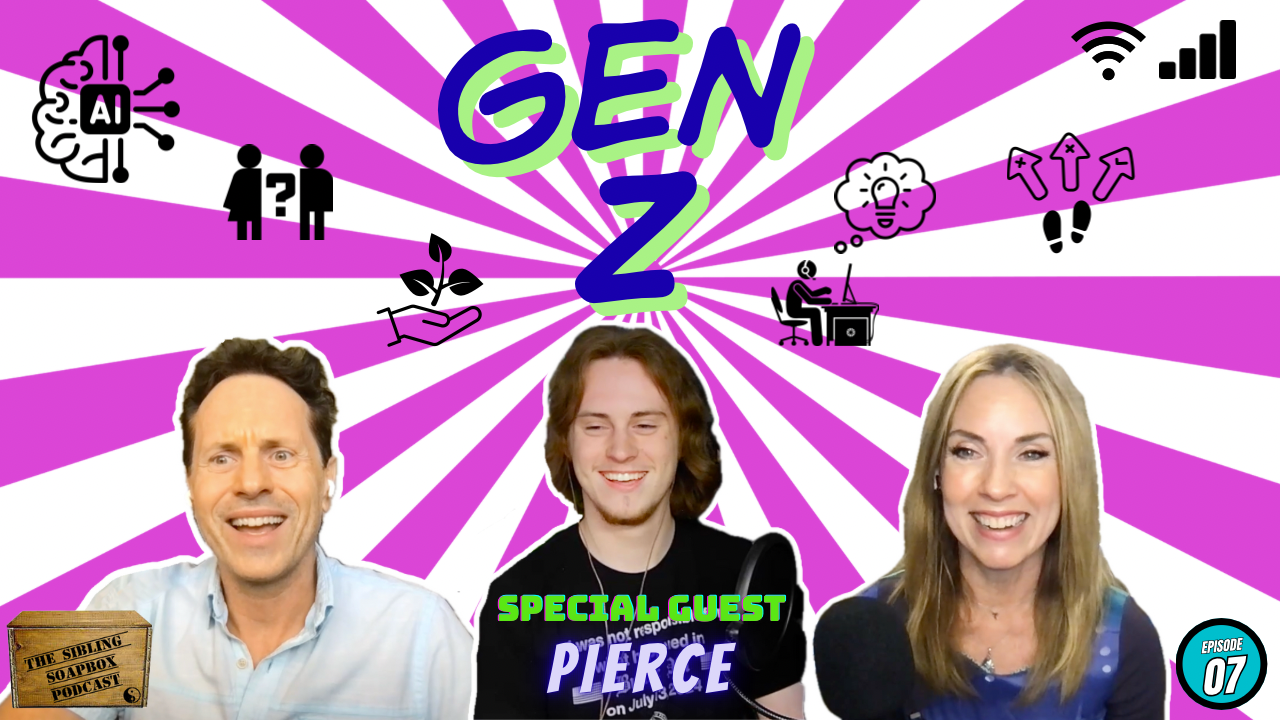Understanding Gen Z – Work, Identity, and the Future of Change

Welcome back to the Sibling Soapbox Podcast blog series!
In this recap, we dive into a lively and eye-opening conversation with our very first guest—Pierce, a proud member of Generation Z. Together, we explore the stereotypes, challenges, and aspirations of today’s youngest adult generation. From work-life balance and career goals to social identity and climate activism, Gen Z is proving to be one of the most influential generations yet.
Breaking Down Gen Z Stereotypes
One of the biggest stereotypes about Gen Z is that they’re “lazy.” Pierce pushes back on that idea, explaining that the real difference isn’t laziness—it’s a demand for better work-life balance, fair pay, and meaningful careers. Rather than following the traditional model of grinding through a 40-hour workweek at any cost, Gen Z is asking, why not do work we enjoy while still living fulfilling lives?
This generational shift highlights the changing definition of success: it’s not just about money, but about mental health, purpose, and autonomy..
College, Careers, and Side Hustles
Pierce also offers insight into Gen Z’s complicated relationship with higher education. With skyrocketing tuition and uncertain job prospects, many young people are questioning whether a four-year degree is the only path to success. Programs like community college “promise programs” (offering free tuition for two years) and vocational training are gaining popularity.
In addition, Gen Z is more entrepreneurial than previous generations. From YouTube channels and TikTok content to investing and side hustles, they’re finding new ways to earn income and define success on their own terms.
Identity, Acceptance, and Social Change
Gen Z is also leading the way when it comes to social identity and inclusivity.. Pierce shares his perspective on how LGBTQ+ issues are embraced more openly among younger people, even though some still face resistance at home. What’s different today is that teens and young adults feel empowered to explore and express their identities earlier—and with more support from peers than previous generations.
This openness is reshaping conversations around gender, sexuality, and acceptance in ways that previous generations often avoided.
Climate Change and Activism
If there’s one issue that defines Gen Z, it’s climate change. Unlike older generations who may feel disconnected from the long-term consequences, Gen Z is facing the reality of a warming planet head-on. Activists like Greta Thunberg have inspired a wave of climate-focused youth who believe their voices—and their votes—can drive meaningful change.
Pierce highlights that the responsibility doesn’t fall solely on individuals to recycle or compost—it’s about holding big corporations and governments accountable for the damage they’ve done. This collective mindset is a powerful shift in activism.
Technology, AI, and the Future
Growing up with smartphones, social media, and now AI tools like ChatGPT, Gen Z is the first generation to fully integrate technology into daily life and education. Pierce acknowledges the benefits but also warns about the risks—AI isn’t perfect and can spread misinformation if used carelessly. For Gen Z, the key is using tech as a tool, not a replacement for critical thinking.
Travel, Culture, and Global Perspective
Gen Z isn’t just thinking local—they’re looking at the global stage. Pierce shares his dreams of traveling abroad and highlights how countries like Denmark prioritize affordable education, healthcare, and livable wages. Compared to the U.S., these systems look much more sustainable and attractive to young people seeking fairness and balance.
Key Takeaways
- Gen Z values balance, purpose, and autonomy over traditional grind culture.
- College isn’t the only path—vocational training, side hustles, and entrepreneurship are redefining success.
- Inclusivity and identity are at the forefront of Gen Z culture.
- Climate activism is a driving force, with an emphasis on corporate accountability.
- Technology is both a tool and a challenge, shaping how Gen Z learns and interacts.
Final Thoughts
This episode of the Sibling Soapbox Podcast shows just how much we can learn from listening to the next generation. Gen Z isn’t lazy—they’re reimagining success, redefining identity, and demanding a better future for themselves and the planet. If that’s not inspiring, we don’t know what is.
👉 What do you think about Gen Z’s outlook on work, identity, and change? Share your thoughts in the comments below or join the conversation on our social channels.

